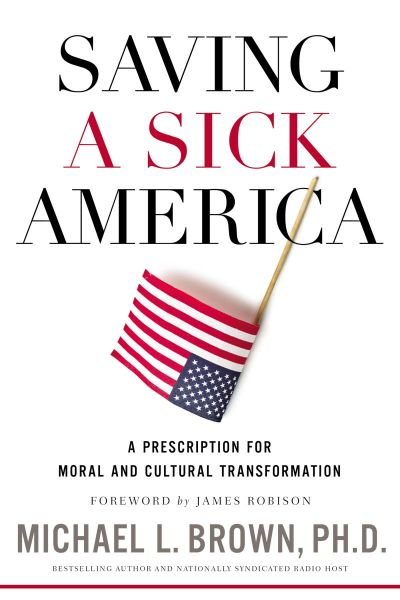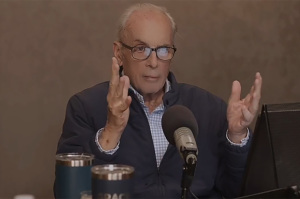Michael Brown Explains How to Save a 'Sick America': New Book (Interview)

America is very "sick" indeed, says popular radio host and Messianic Jewish author Michael Brown, but followers of Jesus have no business being doomsday types because God still has a holy prescription to transform society.
"As someone on the front lines of the culture wars, I'm seeing increasing pessimism" in much of the Church, said Brown, host of The Line of Fire, in an interview last week with The Christian Post about his new book, Saving a Sick America: A Prescription for Moral and Cultural Transformation.
"People talk about throwing in the towel, going into retreat mode, and I was feeling the opposite in my own heart," he said as he began to write the book.
One morning while in prayer he heard that still small voice to write something about the fall and rise of the United States. The books 14 chapters don't attempt to hide how ill America has become. Between the years 1960 and 2000 the divorce rate doubled, teen suicides tripled, and the rate of reported violent crime quadrupled. The prison population quintupled, the percentage of babies born to unmarried parents sextupled, and cohabitation — a predictor of future divorce — increased sevenfold. But the author does not wallow in these sobering statistics and offers hope for healing and recovery.
Such is the heart of God, Brown explained, and He has given his people a battle plan to restore culture in the Word of God.

When Brown began writing Saving a Sick America, Rod Dreher's much discussed book The Benedict Option had not yet released. Brown told CP that his work is a counterpoint of sorts to Dreher's call for a "strategic withdrawal"— from certain areas of society. While Brown and Dreher have much in common, he advocates taking a different approach. Brown doesn't believe that there's a single area of culture that's lost beyond recovery. However dire the circumstances, Christians can continue to show the world that a better way exists.
The author contends in chapter 7 that Americans need to adopt a "multi-generational mentality" and rebuild healthy marriages and families, and for marriages to thrive, long-term vision is required.
"We have two big problems in the West right now" regarding the family, Brown said.
"One is that we are very independent people and we don't recognize the importance of the family, we are scattered, we live individually. But then, we also have a wrong theology in much of the Church — that is a theology of pessimism. Saying that Jesus is coming at any moment and that everything will get worse before He comes."
With such an approach there is therefore no reason to resist the darkness, and the Church functions "like a cancer patient in the final stages."
If one thinks that Jesus will return at any moment, long-term thinking goes away.
Brown, a Messianic Jew, who came to faith in Jesus in 1971 at age 16, noted that such thinking was prevalent when he was young. Brown's granddaughter is now 16.
"If we will esteem family the way God does, if we will get excited about bringing children into the world and if we will live by God's principles, as husbands and wives, as mothers and fathers, then we with a culture of life, a culture that celebrates children and families, we will be the dominant force on the planet in a generation or two."

Just as Orthodox Jews do not intermarry and have many children, the same holds true for Christians who practice a culture that values life.
By both numbers and godly example "we could easily outlast the destructive culture in which we live, demonstrating that God's ways are best," Brown said.
Another thing that the Church must do to cure America from her illness is restore "thunder" to the pulpit, coupled with the love and grace of God, he explained.
"We must have the tender hearts of fathers who care for this hurting, fatherless generation. We need to recognize how wounded many people are. We need to recognize how many in the LGBT community are victims of extreme rejection and, therefore, we need to reach out to all with compassion," Brown stressed.
Such a posture is not at odds with proclaiming the truth and reverence for God's holiness, he maintained.
"Paul writes in Romans 11 that we should behold both the kindness and severity of God," Brown said, "and I find that the pendulum has swung all the way to the other side such that you virtually never leave a service gripped with the fear of God, and I mean a healthy fear."
"You almost never hear a sermon where you are staggered by the reality that one day we will give an account to God. You almost never hear something about the destructive consequences of sin other than 'This is going to hurt your own life; it's all about me' kind of thing."
That approach is simply not loving, he said.
"If America is on the precipice of destruction, shouldn't we be sounding the alarm. That's what love does?" he emphasized. "Let's let Jesus be our model, let Paul be our model, the New Testament writers be our model."
In Saving a Sick America, Brown cites surveys from George Barna that show the vast majority of pastors agree that the Bible speaks to every major cultural and social issue. Yet when asked if they use the Bible to address those issues, around 90 percent said no. And when they were asked why, they responded largely with reasons centered on fear of losing congregants, money, or influence.
"That's absolute compromise" Brown told CP, calling that line of thinking a "Judas" mentality.
Yet the Barna research also reveals that the vast majority of congregants actually do want their pastors to speak on the issues, a desire that is legitimate, Brown said, particularly given how quickly culture appears to be deteriorating.
He noted that he sees many fine leaders in the Body doing a great job but too many need to take a stand.
"I challenge every pastor as a fellow leader in America, ask yourself this question: Are you a shepherd or are you a hireling?"
Brown continued that a particular tension exists for all Christians, who are charged to live in this world but not of it, referencing John 17:14–15.
"At times like this in American history when things are so dark and confused, this is what were made for!" Brown said.
Great revivals have punctuated American history following times of great darkness, he added, and the stage is set for the greatest spiritual awakening the U.S. has ever known.
"So rather than complaining about how bad things are and cursing the darkness, how about turning up the light? How about getting more light out there?" he stressed.
Throughout the book Brown cites several examples of times where conventional wisdom and professional pollsters misread the times, the most recent of which was the 2016 presidential election. No matter how much man believes he controls the world, it is God who holds the future and governs man's affairs, Brown explains.
"Whether you like President Trump or not, the fact that he was elected reminds us that anything can happen," Brown said.
"If I asked you three years ago," he posited, 'Which is more likely: there will be a national spiritual awakening in America or Donald Trump will be our next president with the help of evangelical voters,' everyone would say a spiritual awakening is more likely."
Arguably the most central theme in Brown's latest work is that the wisdom of God is found in the Word of God. With every chapter he aims not to beat people over the head with the Scriptures but to show how God's ways are actually good and life-giving — that the way of the world does not satisfy and does not work.
While planet Earth is not ultimately our home, he said, life here is an opportunity to repay the debt we have to Jesus, and to reach people who have not yet met Him, a theme that's explored in the book's final chapter, 'The Church's Great Opportunity.'
"It is true that in many ways America is post-Christian, yet my concern is not so much with a post-Christian society as with an unChristian Church," Brown writes.
"Let us cast all fear aside, let us look beyond our difficult and sometimes depressing, and let us say with one voice, 'Here we are! Send us! Use us! America must be saved!' What will our Father say in response? I believe He will say to each one of us, 'Yes, I am sending you."





























